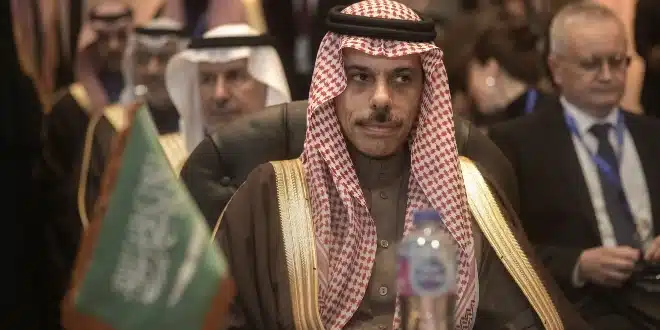Saudi Foreign Minister Prince Faisal bin Farhan is set to make a landmark visit to the occupied West Bank on Sunday, marking the first official trip to the Palestinian territory by a Saudi foreign minister since its occupation by Israel in 1967. According to diplomatic sources, Prince Faisal will lead a delegation to Ramallah, reflecting an increased push from Riyadh to advance the cause of Palestinian statehood as the Gaza war continues to unfold.
The planned visit comes at a time of heightened regional instability and growing international concern over the humanitarian situation in Gaza. It also coincides with renewed efforts by Saudi Arabia to engage diplomatically on the Israeli-Palestinian issue while balancing its broader geopolitical interests.
Growing Regional Pressures and International Recognition Efforts
The Saudi delegation’s visit follows a similar lower-level mission to Ramallah in September 2023, which occurred shortly before the October 7 outbreak of hostilities between Israel and Hamas. That visit marked a shift in Saudi diplomatic posture, with Riyadh stepping up engagement with Palestinian authorities while reiterating support for a two-state solution.
As the war in Gaza continues, with Israeli operations intensifying since March, global criticism has increased. Humanitarian conditions in the enclave have sharply deteriorated, with the United Nations warning of a potential famine and calling for immediate international action.
Against this backdrop, Saudi Arabia is preparing to co-host an international conference in July alongside France at the United Nations headquarters in New York. The objective of the gathering is to reignite momentum behind the two-state solution and encourage broader recognition of Palestinian statehood within the international community.
Currently, nearly 150 countries recognize the State of Palestine, which holds observer status at the United Nations but lacks full membership due to the absence of a Security Council vote. In a significant move, Ireland, Norway, and Spain recognized Palestinian statehood in May 2024. Other European states, including France, have yet to follow, though French President Emmanuel Macron has indicated that recognition could occur as early as June.
Macron has expressed interest in using the upcoming conference to secure recognition of the Palestinian state and simultaneously encourage countries that have not yet recognized Israel to do so. The dual-track approach seeks to create broader diplomatic balance and support for peace negotiations.
Israeli Settlement Expansion and Saudi Diplomatic Calculations
Tensions in the West Bank have also escalated amid Israel’s continued settlement activity. On Friday, Israeli Defense Minister Israel Katz reaffirmed intentions to consolidate a Jewish Israeli presence in the territory, one day after the government announced the authorization of 22 new settlements.
These developments have drawn further criticism from international observers who view settlement expansion as a violation of international law and an impediment to the peace process. The timing of the Saudi visit appears aimed at reinforcing support for Palestinian sovereignty while signaling opposition to unilateral moves on the ground.
Before the Gaza war, Saudi Arabia was reportedly moving toward normalization with Israel, a development encouraged by the United States. During a recent visit to Riyadh, former U.S. President Donald Trump described Saudi-Israel normalization as a personal hope and vision, but acknowledged that any such step would depend on Saudi Arabia’s own timeline.
Saudi Crown Prince Mohammed bin Salman has publicly maintained that normalization with Israel is conditional upon the establishment of an independent Palestinian state. This position was reiterated in November during a joint summit of the Arab League and the Organization of Islamic Cooperation, where participants condemned Israeli actions in Gaza and accused the state of committing genocide.


